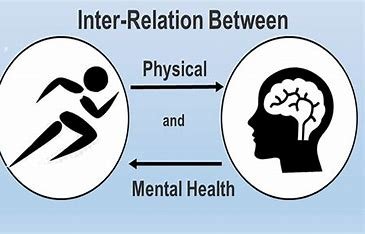The connection between mental health and physical health is profound and complex. These two aspects of health are deeply intertwined, influencing each other in numerous ways. A person’s mental well-being can directly affect their physical health, and vice versa. In fact, a growing body of research shows that mental and physical health are not separate entities but are connected through biological, psychological, and social pathways.

Let’s break down the connection between mental health and physical health, exploring how they impact each other.
1. Biological Connection: The Brain and Body Interaction
The brain and body are constantly communicating with each other, and the state of one can significantly affect the other.
a. Impact of Mental Health on Physical Health
- Stress: Chronic mental health conditions like stress, anxiety, and depression can trigger physical responses in the body. For example, when you’re stressed, your body releases cortisol (the stress hormone), which can have long-term effects on your immune system, heart health, and digestion.
- Chronic stress can increase the risk of heart disease, high blood pressure, and weakened immune function.
- Anxiety and depression have been linked to higher levels of inflammation in the body, which contributes to conditions like arthritis, cardiovascular disease, and diabetes.
- Mental Health Disorders and Chronic Pain: Mental health conditions like depression and anxiety are often linked to increased sensitivity to pain. People with depression may experience more intense perceptions of pain, which can worsen conditions like fibromyalgia, headaches, or back pain.
- Sleep Disturbances: Mental health problems, particularly anxiety and depression, are often associated with disrupted sleep patterns. Poor sleep, in turn, can exacerbate physical health problems like obesity, cardiovascular disease, and diabetes. Sleep deprivation also affects cognitive function and emotional regulation, further impairing mental well-being.
b. Impact of Physical Health on Mental Health
- Chronic Illnesses: Long-term physical health conditions such as diabetes, heart disease, and cancer can lead to emotional distress, anxiety, depression, and feelings of hopelessness. The challenges of managing a chronic illness can take a toll on mental health.
- Chronic pain, for example, is not just physically exhausting but also mentally taxing. People dealing with chronic pain are at higher risk of developing depression and anxiety.
- Physical Illness and Brain Function: Certain physical illnesses can also affect brain function, leading to changes in mood and behavior. For instance, neurological disorders (such as Parkinson’s disease or multiple sclerosis) and hormonal imbalances (such as thyroid dysfunction) can influence mental health by affecting neurotransmitter function or causing brain inflammation.
- Disability and Mental Health: Living with a disability or mobility challenges can increase the risk of developing mental health conditions like depression and anxiety due to limitations in daily functioning, social isolation, and feelings of dependence.
2. Psychological Pathways: Emotions and Health Behaviors
Our mental health also affects our health behaviors, which in turn impact physical health.
a. Coping Mechanisms and Health Choices
- People with poor mental health may engage in unhealthy coping strategies, such as smoking, excessive alcohol consumption, or overeating. These behaviors can lead to various physical health issues, such as liver disease, obesity, heart disease, and respiratory problems.
- Depression and Physical Activity: Depression can lead to a lack of motivation, which may reduce physical activity levels. Physical inactivity is associated with obesity, cardiovascular problems, diabetes, and a weakened immune system. Conversely, regular exercise is known to boost mood and help alleviate symptoms of depression and anxiety.
- Eating Disorders: Mental health disorders like anxiety and depression can contribute to the development of eating disorders (like anorexia or binge eating). These conditions can have serious long-term effects on physical health, including malnutrition, gastrointestinal problems, and metabolic imbalances.
b. Social Isolation
- Social isolation and loneliness are linked to both poor mental and physical health outcomes. People with mental health challenges may experience isolation, leading to a lack of social support and emotional connection. Loneliness has been linked to an increased risk of cardiovascular disease, depression, and even early mortality.
3. The Role of Inflammation in Mental and Physical Health
Recent research has highlighted the role of inflammation in both mental and physical health. Chronic low-grade inflammation is often seen in both physical conditions (like heart disease or autoimmune diseases) and mental health conditions (like depression and anxiety).
a. Inflammation and Mental Health
- Inflammatory markers are often elevated in people with mental health conditions such as depression. This suggests that inflammation in the brain can play a role in the development of mood disorders. The immune system’s response to stress or injury may also contribute to this inflammation.
b. Inflammation and Physical Health
- Chronic inflammation is linked to a wide range of physical health problems, such as heart disease, stroke, diabetes, and obesity. The inflammatory response is part of the body’s natural healing process, but when it’s prolonged, it can contribute to the development of chronic conditions.
4. Mind-Body Practices: Bridging Mental and Physical Health
Mind-body techniques, such as meditation, yoga, and deep breathing, are powerful tools for improving both mental and physical health. These practices can help lower stress, reduce inflammation, and improve overall well-being.
a. Exercise and Mental Health
- Regular physical activity has been shown to improve mood, reduce symptoms of depression and anxiety, and enhance cognitive function. Exercise stimulates the release of endorphins, which are chemicals that promote feelings of well-being and relaxation.
- Yoga and mindfulness have also been proven to improve mental health by reducing stress and anxiety, improving emotional regulation, and fostering greater self-awareness.
b. Relaxation Techniques
- Relaxation techniques, such as deep breathing, progressive muscle relaxation, and mindfulness meditation, can help manage stress and reduce physical symptoms like high blood pressure, muscle tension, and chronic pain. These techniques activate the parasympathetic nervous system, which counteracts the effects of stress and promotes a state of calm.
5. Integrated Approaches to Health
Addressing the connection between mental health and physical health requires an integrated approach, where both are treated together. This can involve:
- Psychosomatic medicine: This approach looks at how psychological factors (like stress, trauma, or emotions) affect physical health, and treats both mental and physical symptoms together.
- Holistic care: Many health professionals now take a holistic approach, treating the whole person rather than isolating mental or physical health. This may include therapy, medication, lifestyle changes, and support from a variety of professionals (e.g., psychologists, doctors, nutritionists).
- Preventive care: Encouraging healthy lifestyle choices (like regular exercise, balanced nutrition, and stress management) helps maintain both mental and physical health.
Conclusion
The connection between mental health and physical health is undeniable. Both aspects influence and reinforce each other, and an imbalance in one area can have significant consequences for the other. Stress, chronic illness, poor health behaviors, and inflammation are key factors that link the two. Addressing both mental and physical health through comprehensive, integrated approaches can lead to better outcomes for overall well-being.
